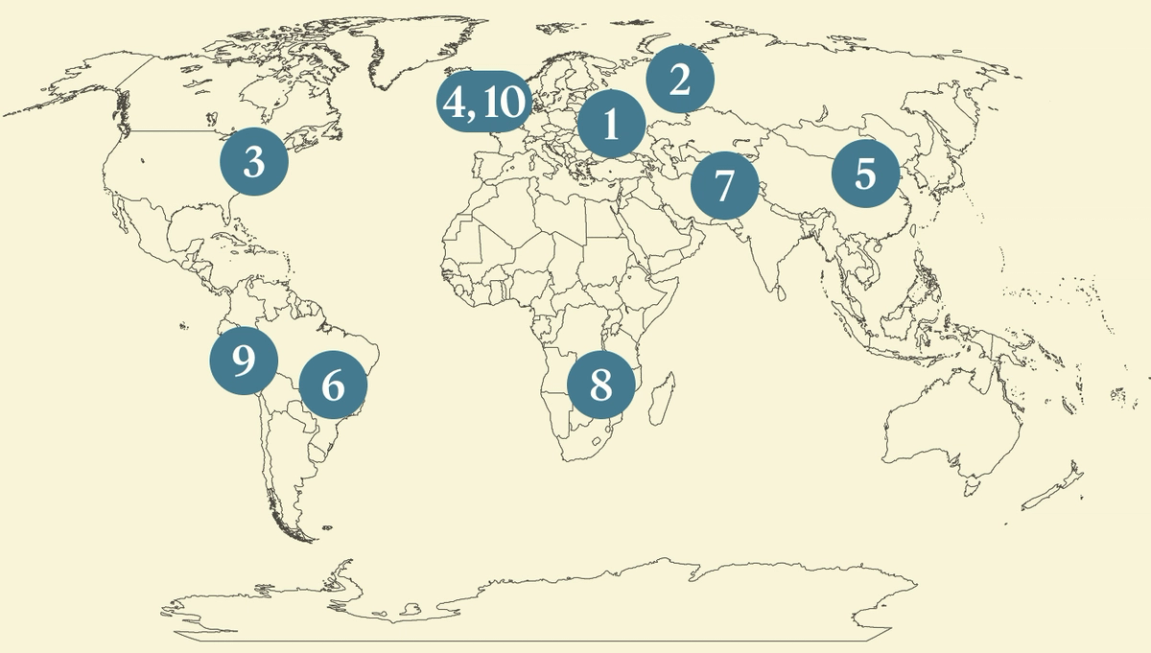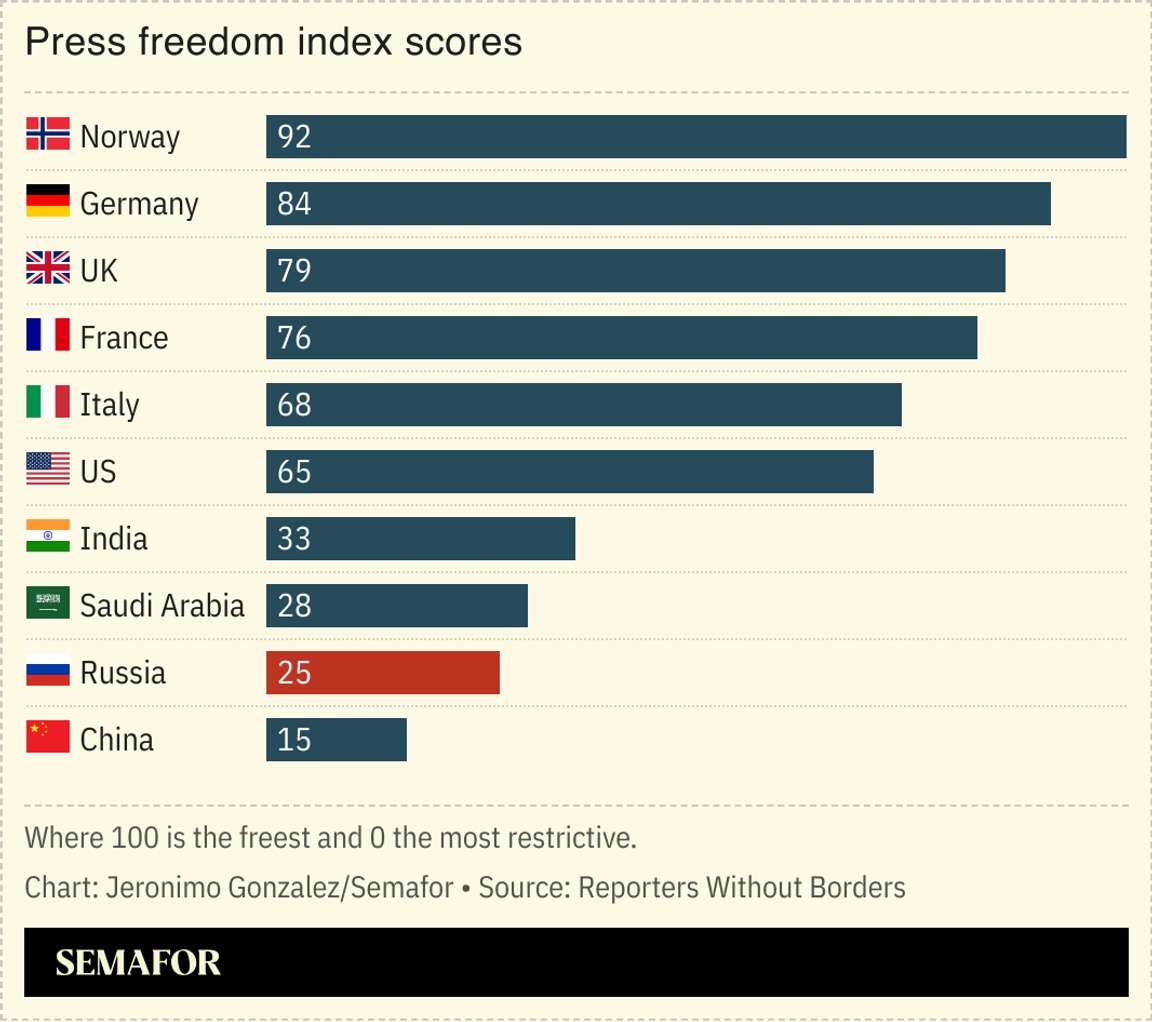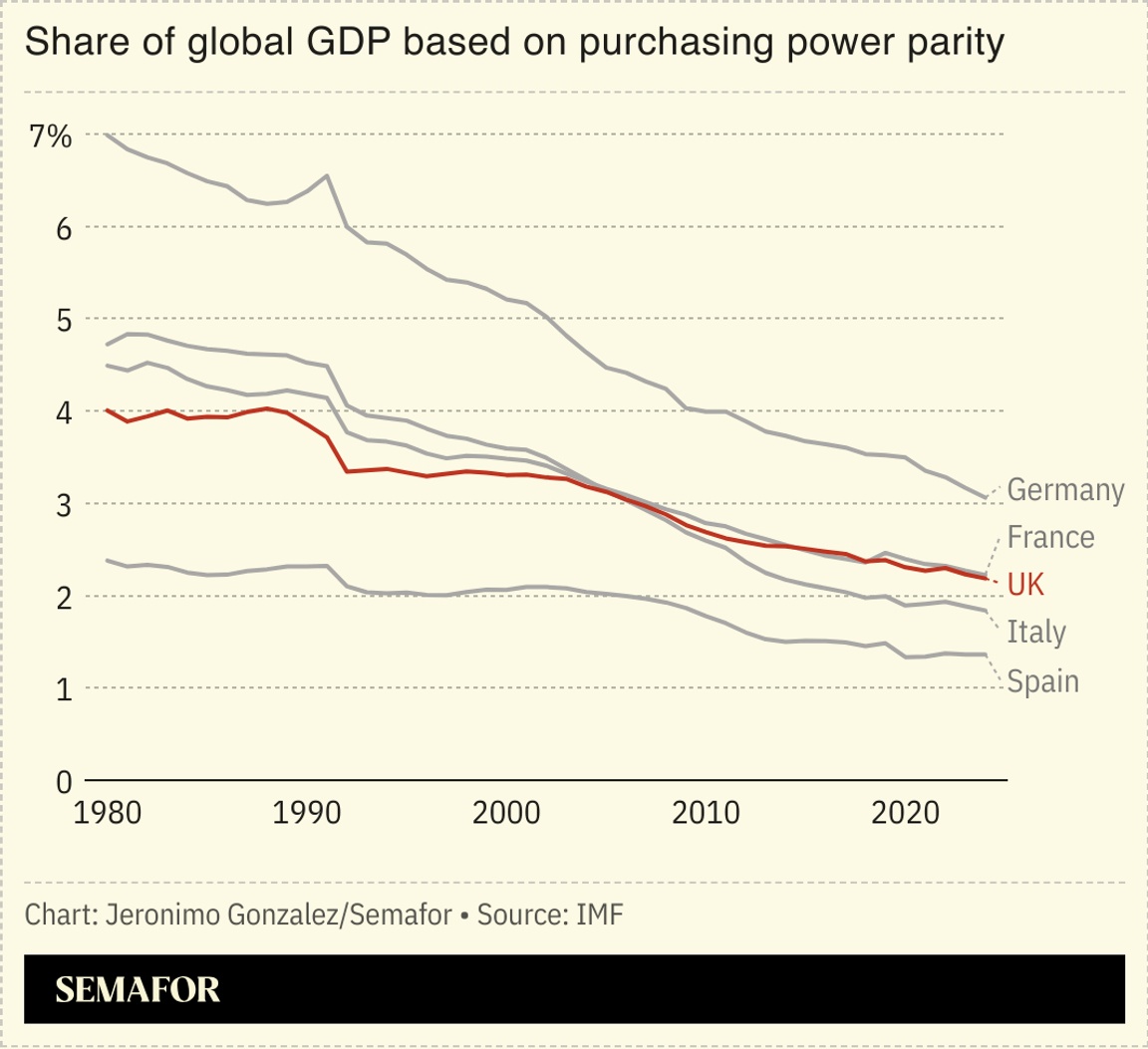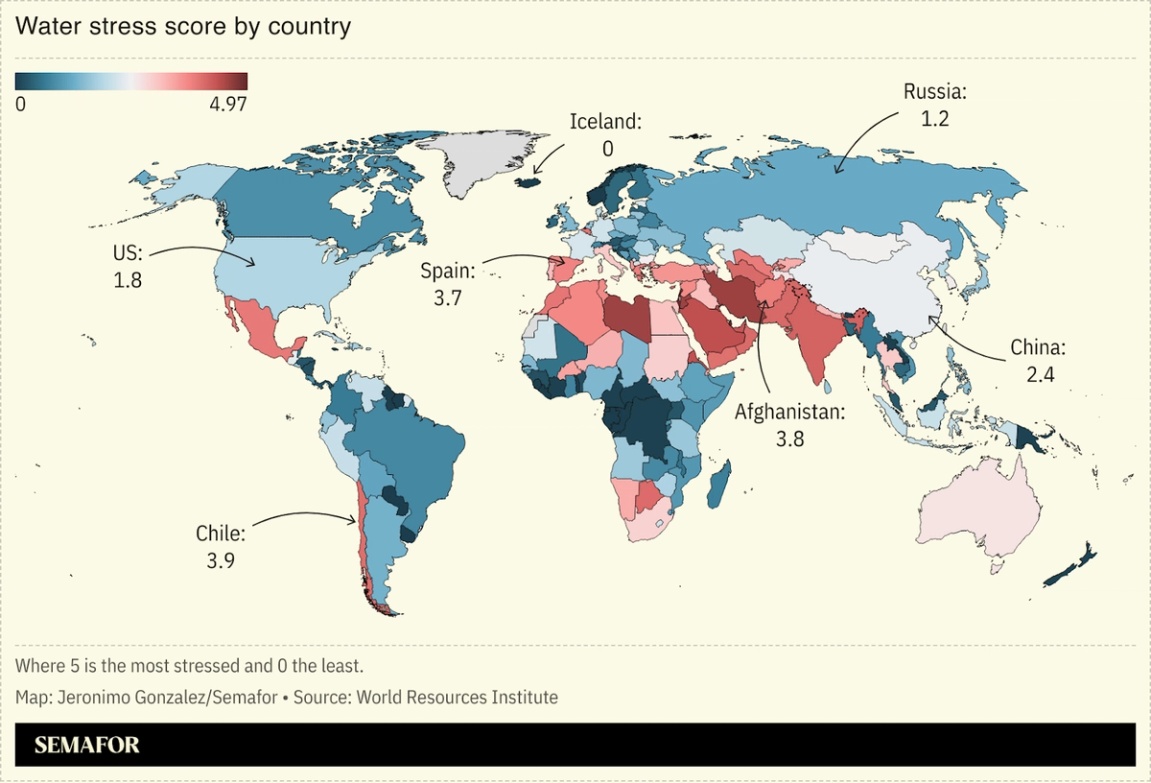| | Russia presses its battlefield and diplomatic advantage, Bessent calls for rate cuts despite fears o͏ ͏ ͏ ͏ ͏ ͏ |
| |  | Flagship |  |
| |
|
The World Today |  - Russia’s advantage…
- …and isolation
- Bessent wants rate cut
- UK’s unexpected growth
- DeepSeek’s Huawei woes
- COP30 faces difficulties
- Kabul, Tehran water crises
- Zambia mine disaster
- Amnesty for Peru police
- Death of English puddings
 The weight of a gemstone, and the best so-bad-it’s-good movie ever. |
|
Russia’s military and diplomatic advantage |
 Stringer/Reuters Stringer/ReutersRussia made its biggest 24-hour advance into Ukraine in a year as US President Donald Trump prepared to meet his Russian counterpart. Data from the Institute for the Study of War showed the Russian army took control of 40 square miles of Ukrainian territory, an offensive that comes as Ukrainian President Volodymyr Zelenskyy faces one of the most perilous moments of his tenure: Weakened domestically after public pressure forced him to backtrack on an anti-corruption law, Zelenskyy has been sidelined abroad, having failed to secure an invite to tomorrow’s meeting between the US and Russian presidents. “Americans are aware this is a moment of weakness for Zelenskyy and they’re using it when they most need it,” an expert told the Financial Times. |
|
Russia’s growing isolation |
 Sony ended all operations in Russia and dissolved its local subsidiary, part of moves both within the country and without to cut Russians off from the wider world. The Japanese tech company has operated in Russia since 2006, but after the 2022 invasion of Ukraine began scaling back operations, halting console shipments and closing online and brick-and-mortar stores. Moscow is adding to its own isolation, blocking all calls on the messaging apps WhatsApp and Telegram in what it called an effort to fight crime and terrorism: The apps are end-to-end encrypted and thus their calls cannot be easily monitored by the government. Since the war, Russia has clamped down significantly on its previously largely unrestricted internet. |
|
Bessent calls for Fed rate cut |
 Magnus Lejhall/TT News Agency/via Reuters Magnus Lejhall/TT News Agency/via ReutersUS Treasury Secretary Scott Bessent called on the Federal Reserve to cut interest rates. Bessent told Bloomberg that the benchmark should be at least 1.5% lower than its current level of 4.25% to 4.5%. President Donald Trump has also repeatedly called for lower rates, but economists are increasingly worried that US inflation is gathering pace, driven by high tariffs, and that high rates are needed to cool it down. One Brookings analyst said that although this week’s overall consumer price index figures looked mild, increases can be seen in key categories, and a Goldman Sachs analysis said tariffs were putting new costs onto consumers. Trump dismissed the concerns, saying Goldman’s CEO should “get himself a new Economist.” |
|
Good news for British economy |
 The UK economy grew 0.3% in the second quarter of 2025, slowing from the first three months of the year but beating expectations. The British government has made boosting the country’s sluggish economy a priority, but in the year since its election has had only moderate success. Recent months have seen some better news, and slowing inflation has allowed the Bank of England to cut rates, meaning average mortgage rates have dipped below 5% for the first time since 2022, when then-Prime Minister Liz Truss announced unfunded tax cuts that sent the market into turmoil. In further good news for the government, fears that rich non-doms would leave the country after recent tax increases appear to have been overstated. |
|
Huawei chips delay DeepSeek model |
 Go Nakamura/Reuters Go Nakamura/ReutersChinese AI firm DeepSeek delayed the release of its latest model after failing to train it on the Huawei chips it uses, highlighting the limits of Chinese processors. DeepSeek — which earlier this year shocked the AI industry after unveiling a highly efficient model — had been encouraged to use Huawei technology by government officials. The firm’s move comes just days after Beijing warned Chinese AI firms to avoid buying Nvidia’s H20 chips over security and quality concerns. Nvidia tailored the lower-performance chip to meet US sanctions on the export of its technology to China. However, experts cautioned that Chinese chip manufacturers are fast catching up with the US: “It’s a matter of time,” a US-based researcher told the Financial Times. |
|
Logistics, Trump hit COP 30 attendance |
 Wagner Santana/Reuters Wagner Santana/ReutersThe COP 30 climate summit could be the smallest version of the event in years, thanks to logistical difficulties and US withdrawal. November’s summit is in Belém, Brazil, a smallish Amazonian city: Attendees are concerned about a lack of rooms and flights, Bloomberg reported. Organizers said they would not move the event, and various countries and bodies have said they will not attend. The most high-profile absence may be the US. The Trump administration has fired its last climate negotiators and will not confirm whether it will send any representatives. The choice of location risks undermining the event’s mandate, Semafor’s Climate & Energy Editor Tim McDonnell said: Every minute spent negotiating logistics is a minute not spent on substantive issues. |
|
Iran, Afghanistan water crises |
 Afghanistan and Iran are facing water crises as shifting rainfall patterns and poor water management hit their reserves. Kabul could run out of water by 2030, The New York Times reported: The cash-strapped Taliban administration is unable to redirect supplies from nearby rivers, and its reservoirs are running low, due to reduced snowmelt and rain, and to unregulated wells. Iran, meanwhile, has seen water pressure drop so low that some apartment buildings’ taps are dry: Supplies in the capital Tehran are predicted to run out in a few weeks, and the government has called on the public to reduce consumption. Droughts and heat waves — as well as extreme rainfall in other areas — have become more common worldwide due to climate change. |
|
Zambia mine disaster worse than feared |
The partial collapse of a dam at a Chinese state-owned mine in Zambia may have released 30 times more toxic waste than initially reported. An independent analysis of the collapse showed at least 1.5 million tons of poisonous substances leached from the dam. The company and the government had previously said 50,000 tons escaped, a “grossly inaccurate” estimate, an auditor said. The spillage increased the acidity of a local river to a level strong enough to dissolve human bones, in what may be one of the mining industry’s worst catastrophes globally. China’s “rapacious desire” for African minerals has led to a surge in output, but also in human rights abuse accusations, tainting Beijing’s image on the continent. |
|
Peru pardons alleged abusers |
 Ajeng Dinar Ulfiana/Reuters Ajeng Dinar Ulfiana/ReutersPeruvian President Dina Boluarte signed a law pardoning hundreds of military and police officers for alleged abuses during the country’s fight against a Maoist militia. The law, approved by Congress, pardoned those who fought the Shining Path — declared a terrorist organization by the US — which threatened to destabilize the Peruvian government until former President Alberto Fujimori unleashed a vicious fight against it. Almost 70,000 people are believed to have died in the conflict between the 1980s and 2000s. Although critics said the new law would ensure thousands of innocents will never see justice, Boluarte hopes the move may boost her approval ratings, which sit at just 2% with presidential elections due next year. |
|
English puddings come to sticky end |
 Tom McCorkle for The Washington Post via Getty Images Tom McCorkle for The Washington Post via Getty ImagesThe English pudding faces extinction, a charity has warned. Traditional English desserts — steamed dishes such as sticky toffee pudding, or sweet pies like apple crumble — have a long history: Dickens mentions plum pudding in 1843’s A Christmas Carol, but the first recipe predates even that by over a century. A 17th-century French travel writer sang their praises, The Guardian reported, saying “Ah! What an excellent thing is an English pudding!” Half of people born before 1970 reported eating hot puddings several times a week as children, compared to just 26% of those born later, and the downward trend has continued. A key shift was the expansion of the female workforce, a historian said, meaning households had less time for cooking. |
|
 - The European Union releases its second-quarter GDP estimate.
- The World Humanoid Robot Games begin in Beijing, the first global sporting event dedicated solely to humanoid robots.
- Helen Mirren and Pierce Brosnan premiere their new film, The Thursday Murder Club.
|
|
|